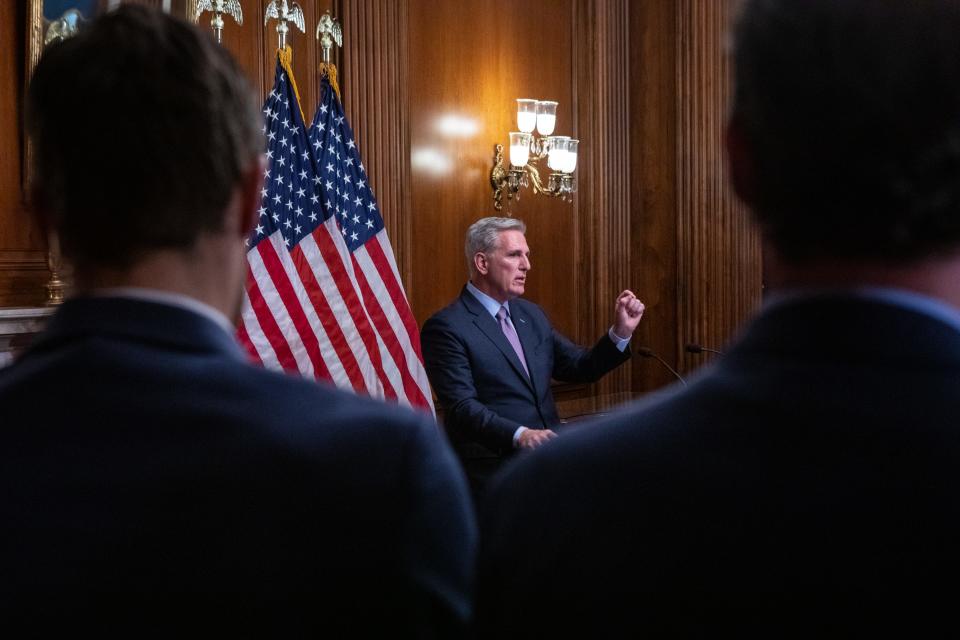Kevin McCarthy was ousted. Who is speaker of the House today? Who's running to be speaker? Explained
WASHINGTON - House Speaker Kevin McCarthy, R-Calif., made history Tuesday after a handful of conservative hardliners and Democratic lawmakers ousted him from the top leadership post in the chamber.
His removal, after 269 days on the job, raises multiple questions, such as who will take his spot now that the seat is vacant and whether the House will be able to resume its normal duties.
The fallout comes days after a stopgap measure was passed in the House and Senate to temporarily fund the government until mid-November, when another potential shutdown looms.
Here's a quick look at lingering questions:
Why was McCarthy ousted as speaker?

The push to oust McCarthy began with Rep. Matt Gaetz, R-Fla., who followed through on a threat and introduced a resolution Monday vacate the speaker.
Gaetz had pressured McCarthy not to work with Democrats to avert a shutdown, but the former speaker did anyway and said he chose what was best for America ? not his job.
"I think we need to rip off the Band-Aid," Gaetz said in a Sunday interview on CNN's "State of the Union." "I think we need to move on with new leadership that can be trustworthy."
Earlier this month, Gaetz also cited several reasons for why McCarthy should be ousted, including McCarthy not holding votes on issues like term limits for lawmakers and balanced budgets, and not releasing the full security tapes from the Jan. 6, 2021 attack on the Capitol.
In a letter sent to House Democrats on Tuesday, Minority Leader Rep. Hakeem Jeffries, D-N.Y., said leadership would vote to vacate McCarthy from the speakership.
"It is now the responsibility of the GOP members to end the House Republican Civil War. Given their unwillingness to break from MAGA extremism in an authentic and comprehensive manner, House Democratic leadership will vote yes on the pending Republican Motion to Vacate the Chair," the letter read.
The 8 Republicans who voted to oust McCarthy
Eight Republican lawmakers and 208 Democratic lawmakers voted to oust McCarthy. The list of eight includes:
Rep. Andy Biggs of Arizona
Rep. Ken Buck of Colorado
Rep. Tim Burchett of Tennessee
Rep. Eli Crane of Arizona.
Rep. Matt Gaetz of Florida
Rep. Bob Good of Virginia
Rep. Nancy Mace of South Carolina
Rep. Matt Rosendale of Montana
Can the House function without a speaker?
Formally, yes. But politically it can be complicated, experts said.
McCarthy had provided a succession list to the House Clerk earlier this year in case his seat became vacant. Rep. Patrick McHenry, R-N.C., was chosen to be acting House speaker from that list.
According to House rules, the person chosen from the list “shall act as Speaker pro tempore until the election of a Speaker or a Speaker pro tempore.” McHenry is the interim, or temporary, speaker.
“So, the House can function in the narrow sense of meeting, voting, etc.,” Charles Stewart III, a professor of political science at the Massachusetts Institute of Technology, told USA TODAY.
However, he added that without a speaker, there is no one with the political authority to speak on behalf of the majority and to engage in difficult negotiations on difficult issues, noting that “that’s the bigger issue here.”
“The speaker is not only a constitutional officer, but the speaker is also the leader of the majority party and represents the majority in complicated political negotiations—with the President and the Senate, especially,” Stewart said.
David Bateman, a professor of policy and government at Cornell University, agreed, noting that “McHenry does not have the clear authorization of the majority, and so his ability to set the agenda is limited politically.”
Who is Patrick McHenry?
McHenry is serving his 10th term in Congress and represents the 10th congressional district in North Carolina.
He is a McCarthy ally and chairman of the House Financial Services Committee, where he advocates for conservative fiscal policies.
Prior to that, he was appointed in 2015 by then House Majority Whip Steve Scalise, R-La., to serve as the Chief Deputy Whip where he helped Scalise build agreement around a conservative policy agenda for the House Republican Conference.
Mark Harkins, a senior fellow at the Government Affair Institute at Georgetown University, told USA TODAY, that “McHenry has been an important asset to former Speaker McCarthy, having helped broker the deal with rebels in January to allow McCarthy to become Speaker.”
“In addition, he was one of two Republican members McCarthy tapped to negotiate the debt limit deal with administration officials earlier this year,” he said.
Who is running for speaker of the House?
Right now, some names are being floated, but there isn’t a clear nominee yet.
After a closed door conference Tuesday night following the vote to oust McCarthy, House Majority Whip Tom Emmer, R-Minn., told reporters that Rep. Steve Scalise, R-La., would make a “great speaker,” according to CNN.
“Steve Scalise has been a friend for a long time,” Emmer said.
Others say Rep. Jim Jordan, R-Ohio, or Rep. Byron Donalds, R-Florida, whose names were tossed out in January, could once again emerge as nominees.
Former President Donald Trump is also being named a potential speaker, but Trump has said he's focused on his 2024 bid for the White House.
Can former President Donald Trump become speaker of the House?
Yes, Trump does have a shot at being speaker.
There is no requirement for the speaker to be a member of Congress, according to Bateman. But speakers have always been members because their interests are most aligned with Congress.
"That's best achieved by having the speaker be another elected representative," Bateman said. "That's not a requirement though."
Contributing: Ken Tran, Rachel Looker, Phillip Bailey
This article originally appeared on USA TODAY: McCarthy ousted: Who is speaker of the House now? Who is running?
